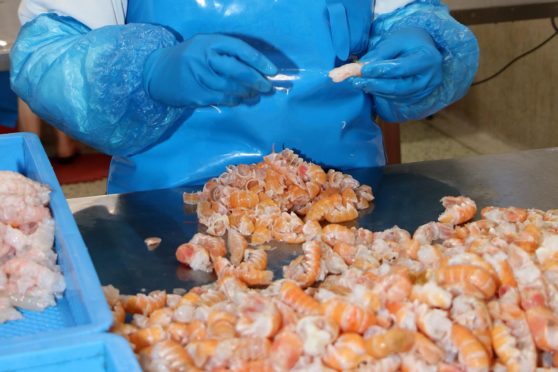A new seafood task force has met for the first time, with Scotland Office Minister David Duguid insisting “it is not a talking shop”.
The group draws together senior political figures, government officials and industry representatives, all bidding to solve ongoing problems with Scottish seafood exports.
HM Revenue & Customs and the UK Government Border Delivery & Protocol Group were both represented.
Chaired by Mr Duguid, the virtual event was also attended by UK Environment Secretary George Eustice and Scottish Fisheries Secretary Fergus Ewing.
Industry representatives on the Scottish Seafood Exports Taskforce include people from the catching, processing and exporting sectors.
Mr Duguid said: “This taskforce is about developing solutions and delivering action rapidly.
“It is not a talking shop and we will provide evidence of delivery.”
Mr Eustice said other UK Government working groups to tackle immediate problems would continue to operate and support businesses to adjust to the new post-Brexit trade rules – troubleshooting where problems occur, such as with issues surrounding export health certificates and customs declarations.
This taskforce is about developing solutions and delivering action rapidly.”
David Duguid, Scotland Office Minister
The movement of mixed loads of small consignments, known as groupage, was discussed during the task force’s first meeting.
So too was the variation in time taken for loads to be cleared, with the Scotland Office reporting “constructive discussions” on how practical solutions could be arrived at to ease the flow of goods.
Mr Duguid, Conservative MP for Banff and Buchan, said: “The spirit of co-operation between all parties was good to see and my officials will now drill down to identify areas for rapid action.
“The next task force meeting is in a fortnight but our engagement with industry continues on a daily basis, as does our work to speed world-class Scottish seafood from port to plate as smoothly as possible.”
Cash support from two governments
The task force may call in other industry representatives and experts on an ad hoc basis.
Its launch has coincided with the roll-out of the UK Government’s £23 million Seafood Disruption Support Scheme (SDSS) to businesses that suffered a financial loss because of delays related to the export of fresh or live fish and shellfish to the EU during January.
This is in addition to the £100m fund announced by the prime minister in December to help modernise fishing fleets and the processing industry, as well as the £32m that has been promised to replace EU funding this year.
The Scottish Government is also making many millions of pounds available to support the seafood sector north of the border.
Seafood exporters were left reeling by Covid-19, which destroyed key markets in mainland Europe almost overnight last year.
Major disruption
Business picked up as restrictions were lifted, but a return to lockdowns and major disruption since Brexit have moved the export goalposts and caused major disruption.
This year started with lorry-loads of valuable but perishable fish and seafood getting delayed at export logistics facilities in central Scotland or at Channel crossing points.
Some of the produce never reached its destination, leading one north-east processor, Royal Warrant-holder John Ross Jr (Aberdeen) to accuse the UK Government of “gross incompetence”.
A convoy of seafood lorries descended on central London in a show of protest, breaching Covid-19 rules, over the chaos caused by Brexit red tape.
Industry chiefs have said the problems are ongoing – forcing some firms to put their businesses on ice – and warned that many exporters cannot access the SDSS cash, because of restrictive eligibility criteria.
Mr Eustice recently acknowledged there was more work to do to help the sector through its crisis, while Mr Ewing has outlined a list of “priorities” for the UK Government-led task force.

